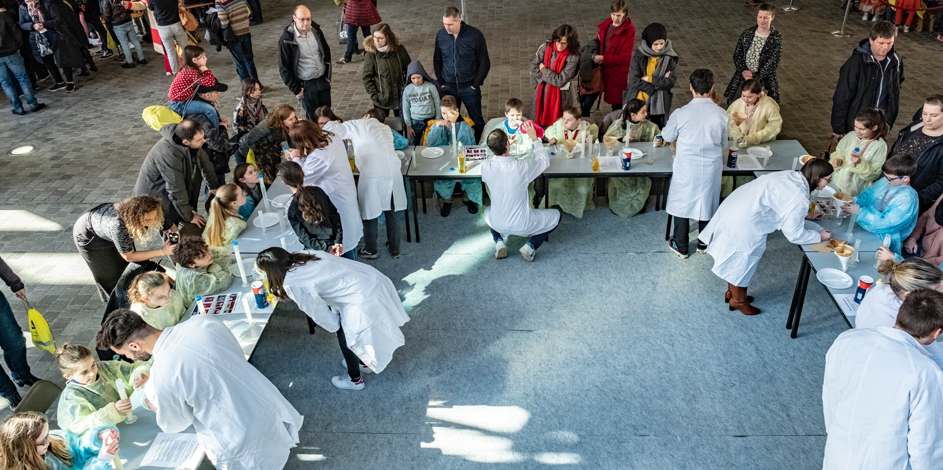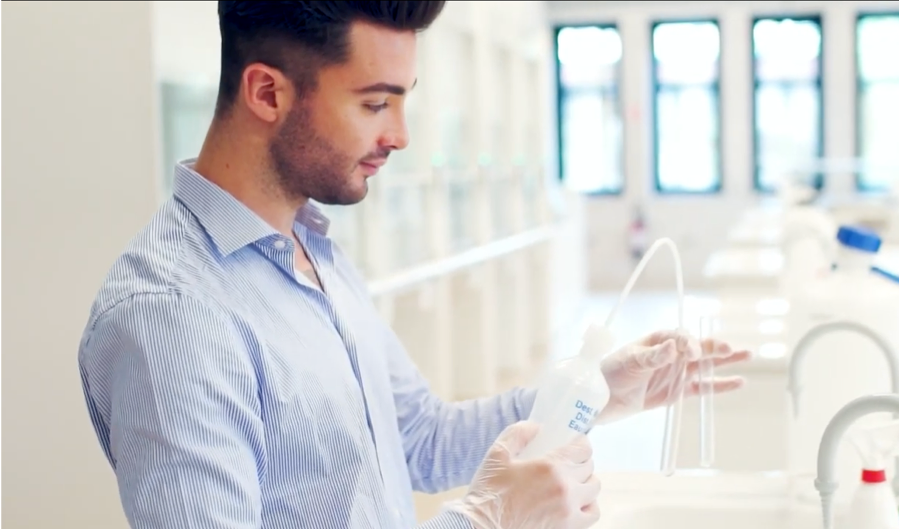
My name is Claudio D’Incal and I’m a PhD student and Teaching Assistant in the Proteinchemistry, Proteomics and Epigenetic Signalling (PPES) Lab, led by Prof. Wim Vanden Berghe.
As from a young age I was interested in science. I loved watching TV shows such as CSI Miami, and learning about anything related to science and health. My curiosity for science quickly turned into a passion and in High School I added Science to my Latin-Mathematics curriculum. Biology and Chemistry classes soon became my favourite. After graduating from High School, I started the Bachelor in Biomedical Sciences at the University of Hasselt and I then transferred to the University of Antwerp to specialize with a Master in Molecular and Cellular Biomedical Sciences.
After I completed my MSc, I decided that I wanted to share my enthusiasm for science with others. So I completed an Educational Master’s degree at the University of Antwerp. This program covers various courses such as didactics, ICT in education, educational policy and organization and applied psychology courses. I learnt how to implement certain teaching tools in a classroom, and also how to understand and deal with the sometimes unpredictable behaviour of adolescents. The educational program also offered many practical courses such as internships and projects.
During my project internship, I created a workshop about environmental awareness and plastics. My students were very interested in environmental topics and spontaneously started a debate. They also had the opportunity to design their own “awareness” campaigns with bio-paints! My other internships gave me hands-on experience with teaching and classroom management.
Like every young graduate, I was very excited to start my career. After my first job application at the High School ‘Sint-Jozef Instituut Kontich’, I was invited for an interview and three days later I was standing in front of a classroom, teaching complex redox Chemistry to the seniors of the Science-Mathematics curriculum. At ASO level (general curriculum in Belgium), I was the Chemistry teacher for all the classes, starting from the third year, and the Biology teacher for the third year. I also taught Natural Sciences to some classes of the fifth year at TSO level (technical oriented curriculum in Belgium).
Being a teacher gave me energy. I enjoyed transferring my knowledge and inspiring my students. I also gained a new and deeper appreciation for the teaching profession.
Many people think that teaching is limited to standing in front of a classroom and preparing and marking coursework. However, standing in front of a classroom quickly made me realise that this was only partially what a great teacher does. A teacher faces many other challenges and has a major impact on the rest of a student’s life.

I aim to let my students discover their own scientific interests. I really want to get them excited and inspired by the topic. Eventually, the more the students are impressed by your experiments, the more that they will want to learn. For me, it was a matter of transferring my own passion for science and to make them fall in love with the subject. Having an academic background and being used to a certain terminology sometimes makes it difficult to explain things in their language. As an academic teacher, it is often challenging to make certain theoretical concepts tangible and easier to understand, in order for them to foster and adopt new skills. Being able to do this is not only important for a (high school) teacher, it is also an important skill for scientists, as science communication can take up a big part of their professional time.
I also learnt to “nurture” my students. I needed to determine: “What are their needs? Are they feeling okay?”. Every student has a different learning trajectory. It is important to recognize differences between students and to carefully adjust your approach so that it fits your students’ needs. As a teacher, you are not only educating your students, but you are also giving them important tools that they can use in other aspects of their lives. That is why I believe that a personal approach is necessary for providing everyone with an equal chance for success. There is one quote that fits this idea perfectly:
“The best teacher teaches from the heart and not from a book”.
After a year of teaching, I realized that I really missed being in a research environment and being immersed in cutting-edge science. Thus, I applied for a PhD assistant position at UAntwerp. This position combines my two passions: teaching and science. Currently, I’m working with Prof. Wim Vanden Berghe on a collaborative project with Prof. Frank Kooy. My project is focused on biomarker research for evaluating the treatment of Fragile X Syndrome, which is the most common monogenetic form of intellectual disability and Autism Spectrum Disorder. I love working on this topic, because different aspects of genomics, transcriptomics, proteomics and kinomics are integrated.

Besides research, I’m also involved in teaching two courses: ‘Integrated Practicals Biochemistry’ (2nd year Bachelor in Biomedical Sciences) and ‘Integrated Research Practicals, Molecular Genetics’ (1st year Master in Biomedical Sciences). In the latter course, I am responsible for teaching the basics of transcriptomic analysis so that the students can learn about the molecular aspects of a disease.
10 years after CSI Miami triggered my passion for science, I hope my story inspires others. My path might seem unconventional, but the message I want to leave you with is: “Keep your end goal in mind and take your time to find out what drives you. Everything is theoretically impossible, until it is done.”
Article written by Claudio D’Incal. Student Editor: Jolien Hendrix. Editor: Dr. Bronwen Martin
